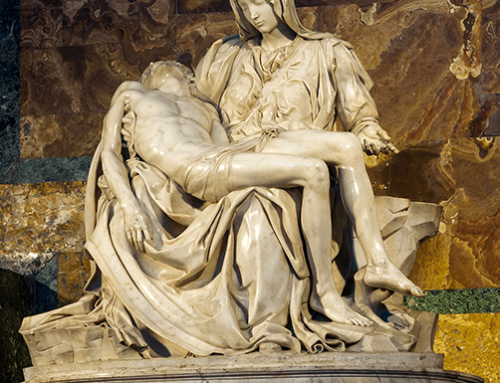 The Apostle John reminds us that, on the night He was betrayed, Jesus knew what was coming. As He gathered together with His disciples, preparing to celebrate the Passover, Jesus knew His betrayal would come by the hand of Judas Iscariot. He knew He would soon be returning to His Father, but He also knew exactly what He would have to endure to get there.
The Apostle John reminds us that, on the night He was betrayed, Jesus knew what was coming. As He gathered together with His disciples, preparing to celebrate the Passover, Jesus knew His betrayal would come by the hand of Judas Iscariot. He knew He would soon be returning to His Father, but He also knew exactly what He would have to endure to get there.
Knowing all these things, Jesus calmly and lovingly washed the disciples’ feet. All of their feet.
He washed the feet of Peter, who balked at the thought of Jesus placing Himself in such a humble position – the very same Peter whom Jesus knew would soon deny Him. He washed the feet of Andrew, Peter’s brother, and the feet of Matthew, the tax collector. He washed the feet of James and John, the sons of Zebedee, whom He lovingly called “sons of thunder.” He washed the feet of Philip and those of Bartholomew; of Thomas, and of James the son of Alphaeus; the feet of Thaddaeus; and the feet of Simon the Zealot. Knowing full well what would come before the dawn, Jesus washed the feet of Judas Iscariot with as much love and care as He displayed to each of the others. He made no distinction.
Then He reclined at the table and celebrated the Feast of the Passover with the Twelve.
After Supper, after Judas Iscariot had left them, Jesus walked with the Eleven from the place they had shared their meal to the Garden of Gethsemane, where He would soon be betrayed.
And as they walked, they talked. In their last hours together, Jesus shared with His disciples the thoughts that pressed most urgently on His heart.
The Apostle John recalls that it was during these hours, while they walked and talked, that Jesus comforted the disciples with assurances that He would not leave them alone. The Holy Spirit would come.
“You know [the Spirit] because He abides with you and will be in you.” Jesus said, “After a little while the world will no longer see Me, but you will see Me; because I live, you will live also. In that day you will know that I am in My Father, and you in Me, and I in you.” (John 14:17,19).
To abide with someone means to stay with them, to spend time with them, to make a home with them. Abiding in Christ means to live in unity of mind and heart with Christ through the power and grace of the indwelling Holy Spirit. Through His abiding presence, Jesus assured the disciples, they would have the power and resources needed to continue His work after He was gone.
He exhorted them:
- If you abide in Me, and My words abide in you, ask whatever you wish, and it will be done for you. (John 15:7)
- You did not choose Me but I chose you, and appointed you that you would go and bear fruit, and that your fruit would remain, so that whatever you ask of the Father in My name He may give to you. (John 15:16, see also John 14:13-14, John 16:23b-24)
Knowing that the events of these hours would be indelibly impressed into the minds and hearts of His followers, Jesus left them with these thoughts:
- Abide in Me
- Ask in My Name
Abiding and asking in His name were inextricably linked to one another by Jesus, but we have often separated them in our thinking. In John 15:4, Jesus commanded His disciples to abide in Him. Then He told them, “if you abide in Me, and My words abide in you, ask, and it will be done for you.”
It is a common practice in the Church today to close our prayers with the phrase “in Jesus’ name. Amen.” It seems almost as though we add the words “in Jesus’ name” to somehow validate our prayers or to make them carry more weight before the throne of God.
As a young Christian, I often wondered what Jesus meant when He told His followers to “ask in His name.” I would read of Jesus’ promise that whatever we asked in His name would be done. But it didn’t seem to work that way.
Yes, God heard my prayers. Yes, God answered my prayers. But to ask “whatever you wish” in His name and receive it? Sometimes God said, “No.” Sometimes God said, “Wait.” Sometimes God said, “I have a better idea.”
So, what exactly did Jesus mean?
I have come to understand that “asking in Jesus’ name” is a certain kind of prayer. And tacking on the phrase “in Jesus’ name” at the end of our prayer request is not what makes it a prayer in His name.
Throughout John chapters 14-16, Jesus weaves the idea of abiding in Him together with asking in His name. Of those who abide in Him, Jesus says:
- I will also abide in them and My words will abide in them (John 15:7)
- They will bear much fruit and so prove to be My disciples (John 15:8)
- They keep My commands (John 15:14, also John 15:10)
- The fruit they bear remains (John 15:16). [It remains because it is eternal, Kingdom fruit.]
So, a person who is abiding in Christ is one who is actively pursuing a deeper relationship with Jesus Christ, who is listening to and obeying the leading of the Holy Spirit, and who is working to accomplish the work that Jesus has asked him or her to do. This doesn’t mean they are a “Super Christian” who never makes a mistake, never has a time when they are slow to listen or slow to respond to the Spirit’s promptings, or who never messes up. But they don’t stay away for long, because their heart is drawn to Christ.
The more one abides in Christ day by day, the more that person’s heart and mind become aligned with the heart and mind of Christ. The more one’s heart and mind are in tune with the heart and mind of Jesus Christ, the more Jesus is able to work through that person’s life to touch the lives of others around him or her. And when Jesus asks one of His followers to do something for Him, He promises to provide whatever is needed to accomplish His work.
Picture the Steward of a King:
The King asks his Steward to do something for him. So, the Steward goes to the King’s storehouse with the King’s authority and presents his request for the materials needed to complete the work. The Steward will surely receive all that he needs to do as the King has asked. I believe this is a picture of asking in Jesus’ name.
In the Church today, we have not always experienced the reality of asking in Jesus’ Name and receiving all that we ask. Perhaps it is because we have separated abiding in Him from asking in His Name. Perhaps it is that, by not understanding the connection between abiding and asking, we have tried to ask for the wrong things “in His name,” not seen results, and so trained ourselves not to believe we will receive.
James explains that, when we ask, we must believe, we must have faith:
But if any of you lacks wisdom, let him ask of God, who gives to all generously and without reproach, and it will be given to him. But he must ask in faith without any doubting, for the one who doubts is like the surf of the sea, driven and tossed by the wind. For that man ought not to expect that he will receive anything from the Lord, being a double-minded man, unstable in all his ways. (James 1:5-8)
The double-minded man is not one who is abiding in Christ. He who abides in Christ is of one mind with Jesus. The double-minded man is, at one moment, wanting to follow Christ, and the next moment, wanting to go his own way.
Living in the sweet spot of abiding in Jesus is what God wants for all of His children. It is not just for a select few. But we must desire it. We must pursue it. Day after day, when the choices come, we must decide whether we want to choose Him, or choose our own way.
Which will you choose today?
Pastor Cindy





I loved this, and it was what I needed to hear today. Abiding and asking go hand-in-hand. 😊
Father God,
May all that read this message learn to abide in your love.
Amen